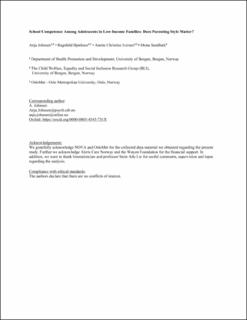| dc.contributor.author | Johnsen, Anja | |
| dc.contributor.author | Bjørknes, Ragnhild | |
| dc.contributor.author | Iversen, Anette Christine | |
| dc.contributor.author | Sandbæk, Mona | |
| dc.date.accessioned | 2021-08-26T07:09:33Z | |
| dc.date.available | 2021-08-26T07:09:33Z | |
| dc.date.created | 2018-03-16T18:00:21Z | |
| dc.date.issued | 2018 | |
| dc.identifier.issn | 1062-1024 | |
| dc.identifier.uri | https://hdl.handle.net/11250/2771301 | |
| dc.description.abstract | In the present study, we investigated parenting styles and self-perceived school competence among low-income adolescents in Norway. The purpose of the study was threefold: (1) to identify differences, if any, in self-perceived school competence between low-income ethnic Norwegians and low-income ethnic minorities; (2) to determine differences, if any, in the perception of parenting styles between the groups; and (3) to determine if parenting styles predict self-perceived school competence in the two groups. The sample consisted of 253 adolescents 12–18 years of age; 130 adolescents were ethnic Norwegians, and 123 were from ethnic minorities. Self-perceived school competence was measured using the Scholastic Competence subscale of Harter’s Self-Perception Profile for Adolescents. Perception of parenting style was measured with the following three scales: support, monitoring and neglect. An independent-samples t-test revealed that ethnic minorities reported higher levels of self-perceived school competence than did ethnic Norwegians. No significant difference between the groups in their perception of parenting styles was observed. Support and monitoring were positively correlated with school competence, whereas neglect was negatively correlated with school competence. When all three parenting styles were entered separately into standard multiple regression analyses for the two groups, a high degree of perceived neglect significantly predicted low self-perceived school competence in both groups. This finding indicates how schools and policy makers can explore the types of support that families may need to adopt better upbringing styles. | en_US |
| dc.language.iso | eng | en_US |
| dc.publisher | Springer | en_US |
| dc.title | School competence among adolescents in low-income families: does parenting style matter? | en_US |
| dc.type | Journal article | en_US |
| dc.type | Peer reviewed | en_US |
| dc.description.version | acceptedVersion | en_US |
| dc.rights.holder | Copyright Springer Science+Business Media, LLC, part of Springer Nature 2018 | en_US |
| cristin.ispublished | true | |
| cristin.fulltext | postprint | |
| cristin.qualitycode | 1 | |
| dc.identifier.doi | 10.1007/s10826-018-1051-2 | |
| dc.identifier.cristin | 1573616 | |
| dc.source.journal | Journal of Child and Family Studies | en_US |
| dc.source.pagenumber | 2285-2294 | en_US |
| dc.subject.nsi | VDP::Samfunnsvitenskap: 200 | en_US |
| dc.subject.nsi | VDP::Social sciences: 200 | en_US |
| dc.identifier.citation | Journal of Child and Family Studies. 2018, 27 (7), 2285-2294. | en_US |
| dc.source.volume | 27 | en_US |
| dc.source.issue | 7 | en_US |
